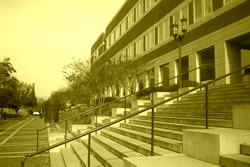|
December 3rd: Italo Calvino's Cosmicomics
and
Semester Wrap Up
Announcements
- Last class meeting is today
- Final Exam on Thurs., 12/12
- Online Course Evaluations--New procedure
Available Nov. 19th-Dec. 5th
Plan for Today
We're going to hit the highlights and parts of Calvino's book that reinforce some of the themes we've covered this semester. The Cosmicomics is a very rich work filled with imagery and complex ideas that would take more than a semester to cover, so we're not going to try to be exhaustive today. Instead, let's ground ourselves by making sure we're on the same page and know what's going on with the characters and various plots.
Then, we'll finish up by relating this work to the major themes of the course. This book is VERY different from the other texts in this class, but, in order to help reinforce what you've learned (what questions you've started to form about texts and their cultural importance), we'll focus more on the similarities with some of the other texts you've read.
Italo Calvino
I'm not going to (re)write his biography, but Calvino's an important literary figure. He's not often talked about in English classes because he's Italian, but his work is known worldwide. Calvino isn't really a science fiction writer but more likely a fantasy writer or fabulist. As you've noticed, his work has a surrealist as well as absurdist quality to it. As an absurdist text, the Cosmicomics plays with readers (quite solid) assumptions about characters: You've definitely read or watch stories where animals are characters, but you probably haven't read stories where a main character is a mathematical equation, an amoeba, a "presence," a dinosaur, a beam of light, a mollusk, and other bizarre forms.
Antonio Illiano (sorry I don't have the full reference) notices that Calvino's "philosophical intention…is cleverly attuned to a complex narrative mechanism which elicits a plurality of meanings" (p. 89). As we've discussed before, creative texts are supposed to expand interpretation; in fact, they shouldn't limit any interpretation. Illiano also comments on the Cosmicomics as a series of short stories about "the creation and evolution of the universe through the eyes of a man-formula called Qfwfq who acts as a kind of cosmic conscience" (p. 90), hence, his retelling of the past, the formation of the cosmos from the dot to universe. Calvino's work is not to create a fixed text. Readers should be free to (re)interpret it and use their own worldview(s) to make sense of the work in, as mentioned before, a senseless, absurd life.
Themes to Relate to the Semester
We've talked lots about illusion, so let's work our way to that. Before getting there, what can we say about these chapters?
Below are some Chapters to ponder:
-
"The Distance of the Moon"--unrequited love
-
"At Daybreak"
-
"A Sign in Space"--semiotics, the study of signs
-
"The Aquatic Uncle"--anyone have a "different" relative?
-
"How Much Shall We Bet?"
-
Social systems tend towards equilibrium. Qfwfq bets with the Dean and wins nearly every bet at first--for millions of years--when there are seemingly limitless possibilities. Then, the Dean, who didn't believe in all the possibilities at first, starts to win. The comment being made is that things tend to balance out.
-
We can relate this to revolutions and politics in general. American politics are based on this balance of power between branches of government and political factions (called parties).
- "The Dinosaurs"
- What other text did you read with this similar theme? Why is it amusing that the "New Ones" have such misguided beliefs about dinosaurs even when confronted by one? What were dinosaurs really like?
Any other thoughts?
Time permitting, let's take a look at an Introduction to Postmodernism I have up for another class.
Acting
In February, Bradley Cooper was interviewd on NPR's Fresh Air with Terry Gross. He discussed his role in the indie movie Silver Linings Playbook. Interestingly, and this isn't odd to hear from an actor, he talks about how he and David O. Russell (the director) wanted him to "play as real and authentic as [h]e could" (para. 1).
What does it mean for an actor to be real, authentic, raw, etc.? What's behind the idea of believability in acting?
Final Exam on Moodle2 (12/12)
December 12, 1901 was a very important date in history. You get to celebrate it by taking your final exam on Moodle2, which will open at 8am and close at 11:59pm on 12/12. You will have two and a half hours to do it. The exam will be 100-125 questions: multiple choice, true/false, fill-in-the blank, and (new for this exam) matching. It is cumulative, but the questions related to the texts since Test 2 will be weighted more than questions related to the first three-quarters of the semester.
Good luck. And may the odds be ever in your favor!
... |
